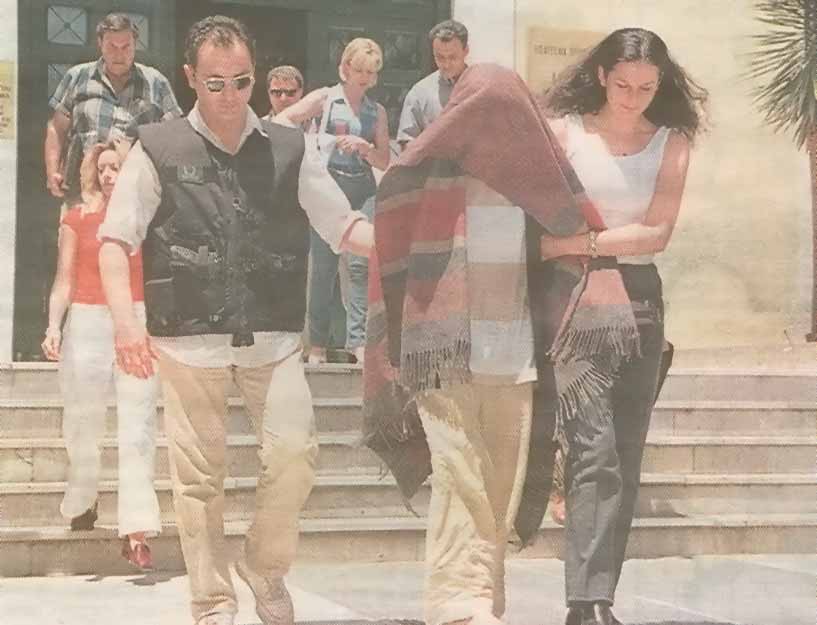 |
||
 A typical scene in front of Athens court |
By George Gilson
Top criminal attorneys paint a bleak picture of graft at all levels of the Greek justice systems, from police to prosecutors and judges |
|
|
When justice is not blind, she is greedy, as Greece's burgeoning judicial corruption scandals have amply shown. The alleged involvement of independent MP Petros Mantouvalos (elected on New Democracy's ticket) may serve to politicise the problem. Appellate prosecutor Kyriakos Karoutsos requested on November 15 that the MP's parliamentary immunity be lifted so he can be prosecuted on charges of bribing a judge and money laundering when he was a Piraeus criminal lawyer. But top criminal lawyers tell the Athens News that corruption has long permeated the Greek justice system at all levels. Scandal revelations snowballed after a Piraeus corruption ring was uncovered at the beginning of the year. It began with an audio tape of Piraeus judge Antonia Elia allegedly telling a drug convict that in order to get off the hook he had to pay a hefty sum to Athens lawyer Sakis [allegedly Kehayoglou], who in turn would pay off an appellate prosecutor. Criminal lawyer Costas Koutras, whose 30-year practice includes a string of sensational nationally publicised cases, says that judicial corruption includes policemen, investigating magistrates, court secretaries, prosecutors and judges. "Each precinct and police directorate - like narcotics, homicide, immigration and robbery - channels cases to specific lawyers. The police get a 20 percent commission," Koutras explains. Top lawyers like Koutras point to select firms which take on very few big ases with high financial stakes and win them all, despite minimal prior experience. Kehayioglou admits he took only 20 cases in five eyars, but he notes he ahndled hundreds of cases while working over a decade for a famed criminal lawyer Alexandros Lykourezos, who ahs not been implicated in the corruption ring. Famed criminal lawyer Alexis Kouyias, whose deposition in August presented incriminating evidence against several colleagues who he, says got 250,000 euro payoffs, believes that judges like Kalousis 'Were mere 'cogs". "I think the judges, who surfaced until now are just one ring. Kalousis' take is small compared to what the heads raked in. The prosecutor is probing other judges as the heads of the corruption ring "those [lower court supervisors] who appointed Kalousis, kept him in his position and sent him cases," he says "Corrupt judges are the root of the corruption ring. But they hooked up with lawyers without principles, and knowledge. These lawyers used associates to handle cases and did not appear themselves," he says. He speaks of corrupt lawyers as mere "money transporters". "The Church of Greece is an incredible part of judicial corruption, especially in the provinces where the local bishop is the real power. Clergy who deal with judges aim to fix their own cases or those of people they favour, not to make money. Giosakis started out trying to fix cases to which he was a party, but when he saw how easy it was he decided to make it ga profession," Kouyias asserts. Criminal lawyer Alexandros Katsantonis, a former law professor, says lawyers are to blame. "No judge ever knocked on'the prison door to say pay me so ,much to free you. Some lawyer approaches a convict and says he has the means to do it for a price," he notes. "At some point, a certain law "office decided to organise the crime of judicial corruption, recruiting judges who issued rulings by being chosen to replace honest judges," he says, alluding to Kehayoglou's office. |
||
HCS readers can view other excellent articles in the News & Issues and especially the sections of our extensive, permanent archives at the URL http://www.helleniccomserve.com./contents.html
George Gilson is a journalist and writer for the English-language Athens News. Readers enjoying his articles may wish to view other fine selections or to subscribe to this publication by visiting the website http://www.athensnews.gr. All articles of Athens News appearing on HCS have been reprinted with permission. |
||
 |
||
|
|
||
|
2000 © Hellenic Communication Service, L.L.C. All Rights Reserved. http://www.HellenicComServe.com |
||
